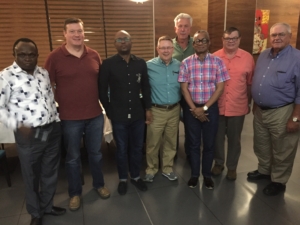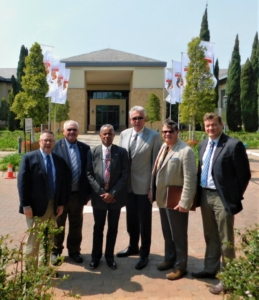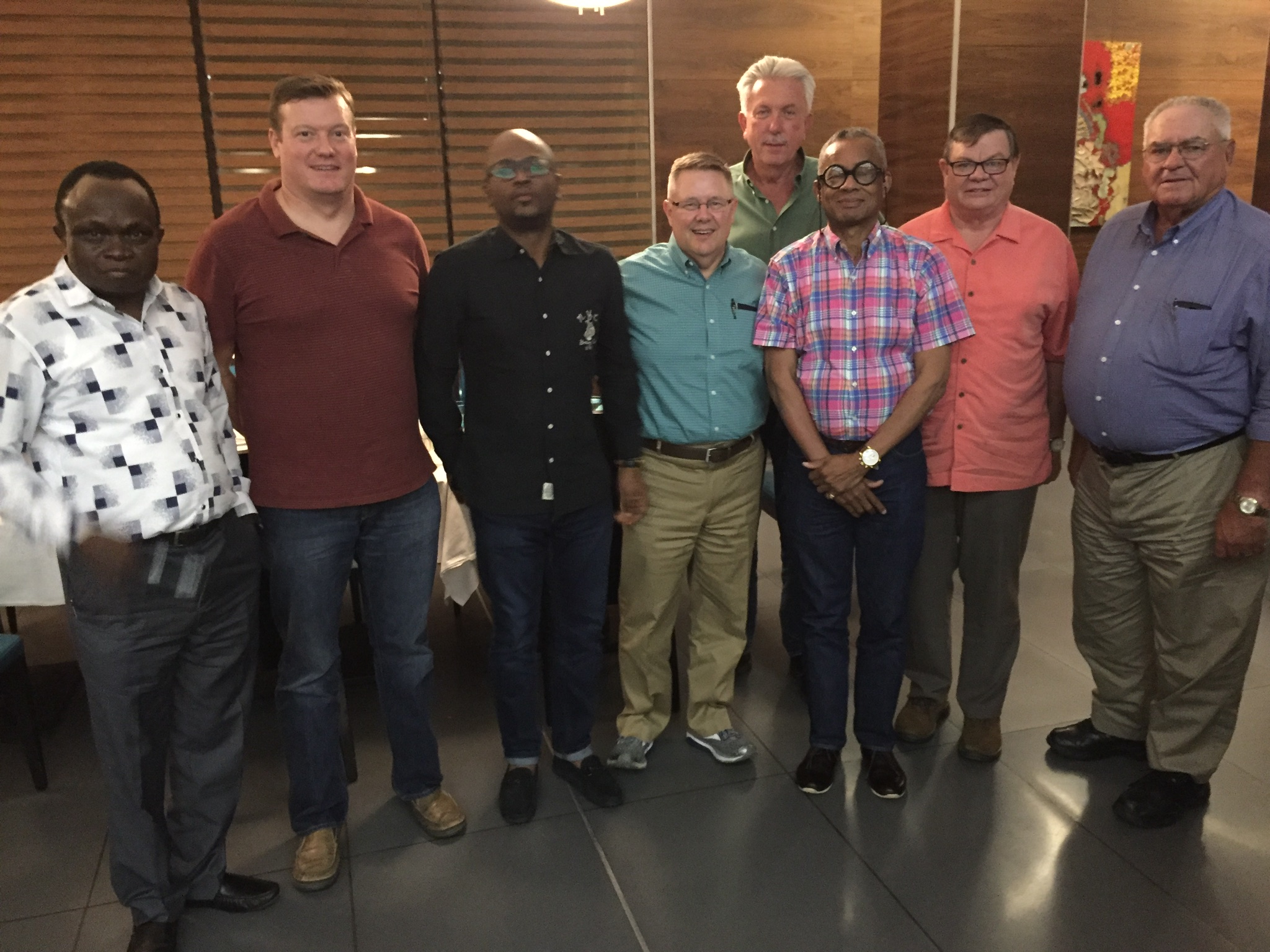Wheat Growers See Challenges and Promise in African Markets
By Steve Mercer, USW Vice President of Communications
Things have changed in Nigeria’s flour milling industry. Members of a U.S. Wheat Associates (USW) Board Team meeting with millers in Lagos recently learned more about how the West African nation’s economy and consumer preferences are forcing mills to reduce costs and produce a wider range of flour products without diminishing quality.
State wheat commission leaders who participated in the Sub-Saharan Africa Board Team that traveled to Lagos, Nigeria, and Johannesburg and Cape Town, South Africa, included Jay Armstrong of Muscotah, Kan., a Past-Chairman of the Kansas Wheat Commission and USW director, Michael Edgar of Yuma, Ariz., and Don Schieber of Ponca City, Okla., who are both Past USW Chairmen. USW staff included Vice President of Communications Steve Mercer and Assistant Regional Director Chad Weigand. USW Marketing Consultant James Ogunyemi and Administrative Officer Olatunde Omatayo, based in Lagos, and Regional Director Gerald Theus, based in Cape Town, met the Team in Lagos.
Many millions of Nigerians cannot afford to spend much more than $2 on food every day, according to USDA Foreign Agricultural Service Regional Agricultural Counselor Jude Akhidenor, who briefed the Team in Lagos.
“We used to sell all we could produce; now we produce only what we can sell,” the general manager of a leading Nigerian flour milling company told the Team. He said consumers are looking for variety and mills are competing aggressively to respond. High-loaf bread is being eclipsed by instant noodles and pasta as staples.
Nigeria is one of the few global markets that has imported all six U.S. wheat classes. The changes in the market are putting pressure on Nigerian mills to cut their costs, however, leading to a growing volume of imported Black Sea region wheat because its price has been significantly lower than the U.S. hard red winter (HRW) that used to dominate Nigerian imports. Nevertheless, one leading miller in Nigeria continues to import HRW even in the face of that price difference.

USW 2018 Sub-Saharan Africa Team, L – R, James Ogunyemi, Chad Weigand, Oletunde Omatayo, Steve Mercer, Michael Edgar (behind), Gerald Theus, Jay Armstrong, Don Schieber.
The team members noted that the price of HRW and other U.S. classes is determined transparently by the market, not by farmers or the sellers and emphasized the industry’s efforts to continue improving HRW milling, baking and processing characteristics. The shift will likely continue, the millers said, even though they know by experience that HRW offers consistent performance and usually higher quality milling characteristics than Black Sea wheat.
“For those who like to see things stay as they are, that would be disappointing,” said Armstrong. “Markets change, however, and for those who like to adapt to new markets this could be viewed as an opportunity. To be more competitive again in Nigeria, I believe we will have to ramp up production of hard white (HW) wheat back at home. The millers we met with in Nigeria and in South Africa all made it clear the benefits of hard white wheat would outweigh cost differences.”
After USW introduced HW to Nigerian millers in 2008, Nigeria became the leading global importer of this wheat class.
Scaling up HW production in the United States to the point at which exportable supplies are consistently available will take a long, sustained effort. There are signs that the industry is moving in that direction.
Hard red winter wheat, however, will remain a very competitive class in the domestic market and in many other parts of the world. The U.S. supply chain is doing all it can to make HRW as competitive as possible, including opportunities to reduce export basis. This year, as exportable Russian wheat supplies decline or are blocked by government interference, Nigeria’s millers will be prepared to import more HRW.
From Lagos, the team travelled to Johannesburg, South Africa, and then to the capital city of Pretoria to meet the USDA/FAS agricultural team headed by recently posted Minister Counselor for Agricultural Affairs Jim Higgiston. Over lunch, he and his colleagues discussed the South African agricultural economy and unique challenges including the government policy of “expropriation” of land.
Income and gross domestic product are significantly higher in South Africa compared to Nigeria, but as they visited flour millers there the last two days of their trip, the Team members heard that cost is also a determining factor. In addition, the South African government sets domestic wheat prices at levels that remain consistently more competitive than U.S. No. 2 HRW prices to encourage production at home.

The USW Board Team at Tiger Foods headquarters in Pretoria, South Africa.
Three meetings with the flour milling divisions of successful South African food companies rounded out the team’s trip.
“It was very encouraging to hear that South Africa’s millers like U.S. wheat very much and do import more of it when prices are more competitive,” said Schieber. “And the people we met were so welcoming. One of the managers spent the last free day on our trip taking me to visit an implement dealer and a farm machinery show. I really appreciate that.”
Two additional highlights of the team’s South African visit were a tour of a plant where a popular, wheat breakfast food is produced and time with a very impressive South African family at their large dairy and grain farm.
USW and the team members want to thank all the customers they met on this trip for their candor and hospitality, and the USW staff who worked hard to make the arrangements, including Financial Accountant Cathy Marais and Regional Program Coordinator Domenique Opperman based in the USW Cape Town Regional Office.


